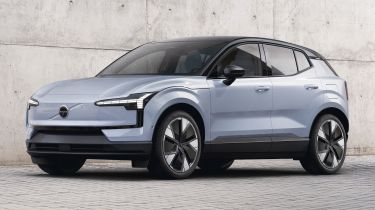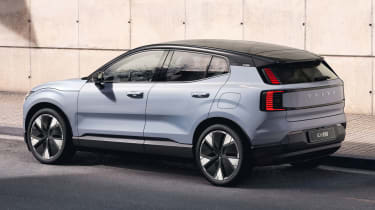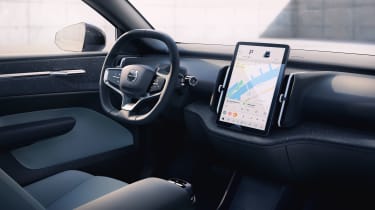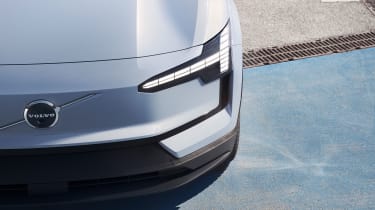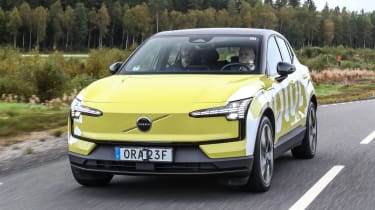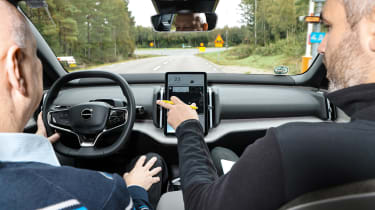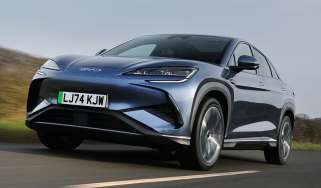New Volvo EX30 small electric SUV: prices, specs and ride review
Volvo’s next electric car is a small SUV that shares its parts with the new Smart #1, and we’ve been for an exclusive ridealong
- Official range of up to 298 miles in Extended Range spec
- EX30 to sit below XC40 Recharge in lineup
- Order books open now with deliveries expected in early 2024
The Volvo EX30 is the brand’s next pint-sized electric SUV, and a major step towards its goal of half its lineup being electric by the end of 2025. It will be the maker’s entry-level electric model, and one of the most compact EVs in the ‘premium’ segment, sitting below the Volvo XC40 Recharge.
In terms of size, the EX30 is around 4.23 metres long – that makes it almost 30cm shorter than an Audi Q4 e-tron and nearly 25cm shorter than the Mercedes EQA. In fact, it’s almost completely devoid of true premium rivals; size-wise it stacks up strongly alongside more mainstream models like the Jeep Avenger and Vauxhall Mokka Electric – both of which share a platform and electric motor.
 Top 10 best electric SUVs – the ones to buy in 2025
Top 10 best electric SUVs – the ones to buy in 2025
The EX30 shares Volvo’s angular and boxy design language, incorporating cues such as the brand’s ‘Thor’s Hammer’ headlight signature – now pixelated in a similar way to the maker’s flagship EX90 SUV. The baby electric crossover also gets very short overhangs, a near-vertical tailgate and upright stance, while prominent wheel arches help give it a wide, chunky look.
As parent company Geely also produces the Smart #1 electric SUV, the EX30 shares this car’s platform, known as the Sustainable Experience Architecture (SEA). The EX30 will be available with three different powertrain specifications: an entry-level single-motor rear-wheel drive version, a higher-performance, longer-range rear-wheel drive variant and a dual-motor four-wheel drive range-topper with more than 400bhp. It’s this version we’ve had a chance to sample from the passenger seat – you can read more about our experiences further down this page.
Volvo EX30 interior design
Volvo is becoming increasingly known for its beautiful interiors, and the brand says the EX30’s cabin ‘embraces sustainable thinking’. It’s also designed with plenty of clever storage features to ‘deliver a big-car experience with less.’ An example of this is the relocation of the glove box to the centre of the dash, making it easier for all occupants to access, while also freeing up space ahead of the front passenger. There’s also a sliding centre console with an open lower section for quick access.
A new soundbar sits on the top of the dash, meaning the doors do away with speakers, and the window switches have been placed on the centre console. Doing this reduces complexity from a hardware and wiring perspective, allowing Volvo to fit more cost-effective and minimalist front doors – as has been done in cars like the Fiat 500 in the past.
There is no conventional instrument cluster ahead of the driver. Instead, the 12.3-inch central display shows information such as speed and charge levels, plus infotainment and sat-nav functions on the lower half. Sitting alongside EX30 product lead Joakim Hermansson, he tells us: “It felt unusual at first, but within 500 metres it was normal.”
But in an effort to reduce driver distraction, Volvo is also incorporating a ‘calm’ mode that removes unnecessary information from the screen. The EX30 will be offered with Apple CarPlay alongside built-in Google apps like Google Maps.
To offer a degree of personalisation, the interior will be offered in a variety of what Volvo calls ‘rooms’. To keep up its sustainable credentials, these use materials such as upcycled denim, woven flax, ground plastic waste and recycled PET bottles.
Of course, the EX30 is a small car, so offers a modest 318-litre boot, which rises to 622 litres with the rear seats folded down – though we suspect this figure is measured to the window line rather than the roof like most rivals do. On visual inspection, the boot looks competitive for the class, and most likely big enough for most young families. Under the bonnet, you’ll find a small frunk for storing the charging cables, while on the bootlid there’s a handy size guide to help the user to determine if large items will fit. Useful if you frequent a certain Swedish flat-pack furniture store.
Volvo EX30 safety
Volvo is a brand known for its focus on safety throughout its lineup, and this won’t be any different for the EX30. The small electric SUV will get an alert system which warns occupants if cyclists or other traffic users are approaching the car as a door is about to be opened, helping to avoid accidents. It’s part of Volvo’s latest Safe Space Technology suite to help keep the brand on the top of its game in terms of safety.

Other safety features include an advanced driver alert system which comes as standard, monitoring eye and face movements around 13 times per second to make sure the driver isn’t fatigued and thus unsafe to drive. It also gets a far-side airbag on the inside of the driver’s seat to help protect from head and thorax injury in a side impact. Because it’s an electric car, the brand has also put in measures to reinforce the integrity of the battery in case of a collision – a damaged battery can cause a car to catch fire if it shorts, so it’s a measure intended to mitigate that risk.
Volvo EX30 powertrains
The Volvo EX30 is available in three battery and motor configurations. The entry-level model uses a single motor at the rear axle producing 268bhp, boasting a top speed of 112mph, and a 0-62mph time of 5.7 seconds. This motor is paired with a 51kWh battery (49kWh usable) delivering up to 212 miles on a single charge – this model is also capable of 150kW charging speeds, meaning a 10-80% top-up should take around 26 minutes.
The Extended Range model uses the same motor paired with a larger 69kWh (64kWh usable) battery. It manages the 0-62mph sprint a little quicker, in 5.3 seconds, with the same 112mph top speed. Its larger battery delivers up to 298 miles on a charge according to official figures, and 175kW charging speeds mean the 10-80% top-up time takes around the same as the smaller-battery model – 27 minutes according to official tests.
The top-of-the-range Twin Motor Performance model gets the same battery and charging speed as the mid-range model, but sacrifices some of its range for quicker performance thanks to its extra motor at the front. Total output is an impressive 422bhp, allowing this model to hit 62mph in just 3.6 seconds. The Twin Motor Performance will get up to 286 miles to a charge according to Volvo’s figures.
Volvo EX30 trim levels and release date
The EX30 is now available to order in the UK with deliveries expected in the first quarter of 2024. Buyers can choose between two trim levels: Plus and Ultra. A cheaper ‘Core’ model, expected to slash around £2,000 from the base car’s price, will join the range later on.
As it stands, Plus costs from £33,795 and gets the 12.3-inch Google-based infotainment system with wireless Android Auto and Apple CarPlay, 18-inch alloy wheels, a premium Harman Kardon audio system, dual-zone climate control with a heat pump, heated front seats and steering wheel, front and rear parking sensors, a rear-view camera and three-phase 11kW onboard AC charger. Buyers also get a three-year, 60,000-mile ‘care package’ which includes all servicing as part of the package.
Ultra starts from £42,045 and is only available with the larger battery in rear-wheel or four-wheel drive. These models get a 360-degree camera, automatic parking technology, a panoramic roof, 20-inch alloys, power-adjustable front seats, tinted rear windows and a 22kW three-phase onboard charger.
Volvo EX30 ride review – Richard Ingram
The new Volvo EX30 is an incredibly important car for the brand, and is expected to sell in big numbers. It effectively sits in a class of one – priced on par (or just below) similarly-sized mainstream rivals, but dramatically undercutting larger and more premium models like the Tesla Model Y and BMW iX1.
So when we were given an exclusive chance to ride shotgun in the new Volvo around the brand’s complex and challenging proving ground in Sweden, we jumped at the opportunity. Sitting alongside a Volvo veteran of almost 40 years, technical lead for vehicle dynamics, Egbert Bakker was our chauffeur for the day.
He first wanted us to sample the EX30’s ride quality – ushering us to a section of the test track he and his colleagues refer to as the ‘English road’. It’s accurately modelled on a section of typically broken tarmac near Stansted Airport in Essex, and would ordinarily shake even the most accomplished small SUVs to bits. The EX30 remains composed, however; you can feel the ripples beneath you, but there are no sharp jolts or upsets.
It seems to work well over larger undulations too, managing to use the car’s suspension travel to absorb these lumps and limit any longitudinal movement. There’s pronounced roll through the corners, but as Bakker reiterates, this isn’t a sports car, and nor is it pretending to be. This is the trade-off for the EX30’s impressive comfort.
It’s quiet too. Our car is sitting on the very largest 20-inch aero wheels fitted to all Ultra models in the UK. These have a particularly wide profile, but road noise is kept to a minimum; there’s a bit of wind noise around the door mirrors, but this is a small SUV that’ll surely be capable of longer motorway stints as and when necessary.
It’s certainly got the performance to back it up. A supplementary stint alongside EX30 product lead Joakim Hermansson allows us to experience a series of standing starts, as well as mid-range acceleration from 50-70mph. It’s faster than any family car needs to be, but Hermansson quickly justifies why the brand’s smallest car requires such stealthy straight-line speed: “With power, you can overtake in a much safer way,” he tells us…
Those wide tyres generate a good amount of grip, probably aided by our test car’s dual-motor setup – and Bakker shows us how easy and undramatic it is to trim the EX30’s line mid-corner, even at high speed.
While he’s clearly enjoying himself, he remains resolutely on-brand: “To drive, a Volvo should be predictable, controllable and comfortable,” he tells us. We’ll need to wait a little longer to deliver our definitive verdict, but even as a pre-production prototype – experienced only from the passenger seat – this seems as close to complete as we could hope it to be.
Can’t wait till 2024 for a new car? Check out our list of the top 10 best small SUVs you can buy now
Recommended

New Subaru Trailseeker revealed as rugged electric SUV with 375bhp

New Subaru Solterra brings more range, power and polish
Most Popular

Suzuki’s new 10-year warranty is free – here’s how to get it

Omoda E5 targets rivals: now with zero deposit and APR
Tips & advice

Car dashboard warning lights: what does each symbol mean?

Electric car charging stations: public networks, charger types, apps and maps

